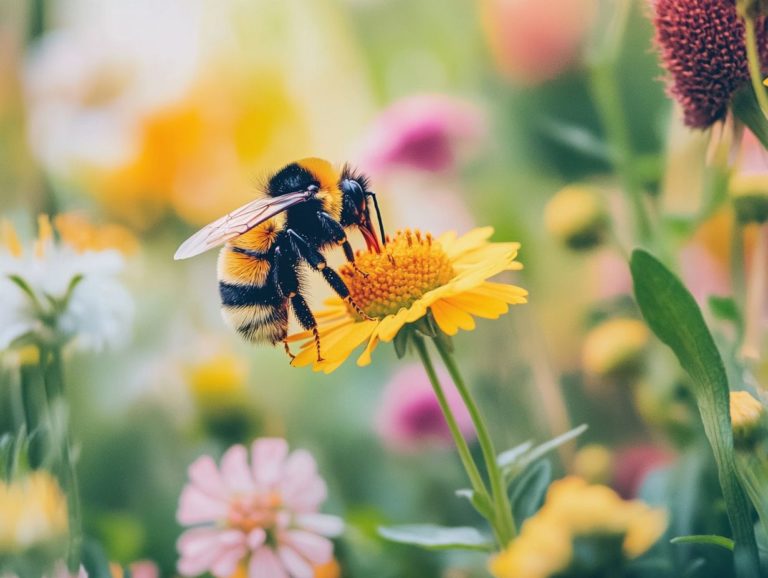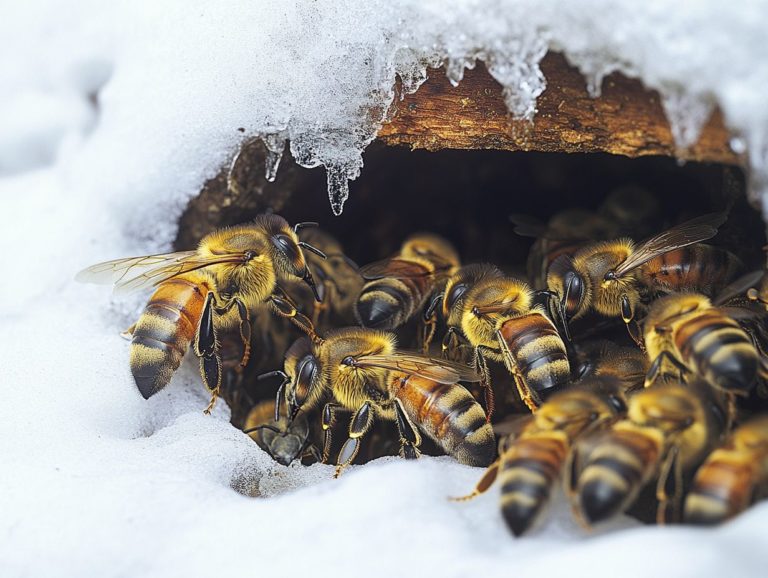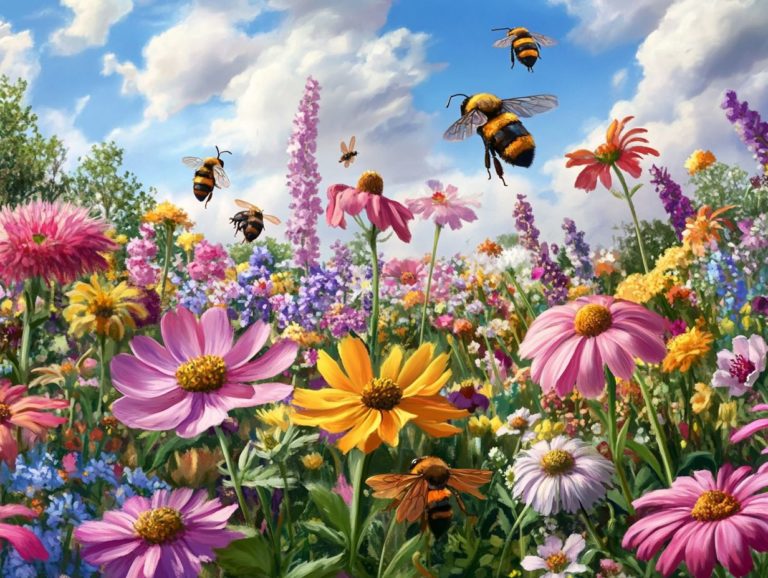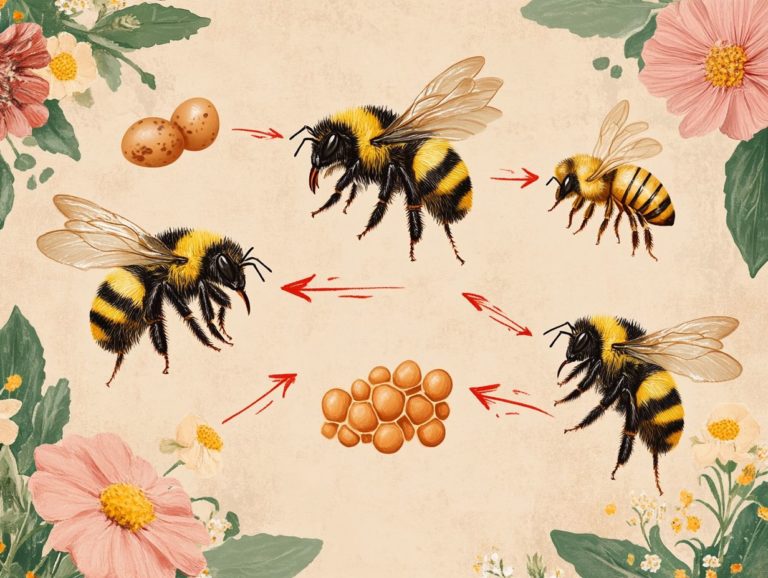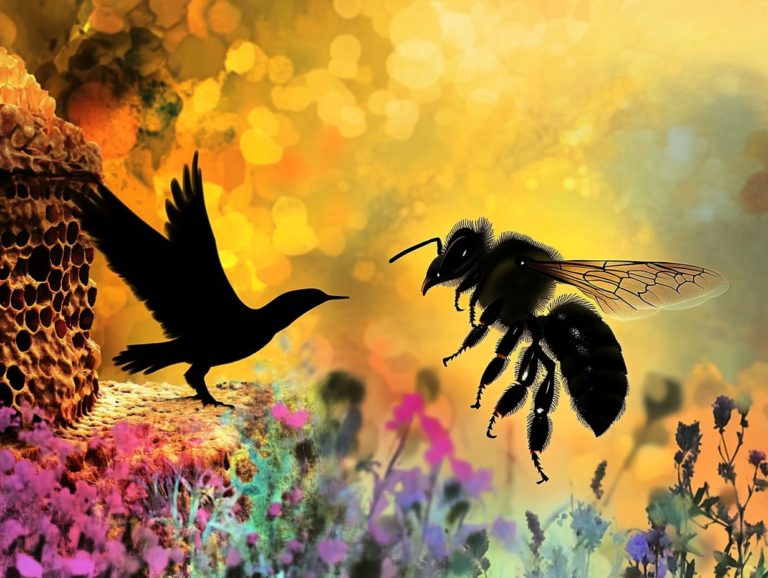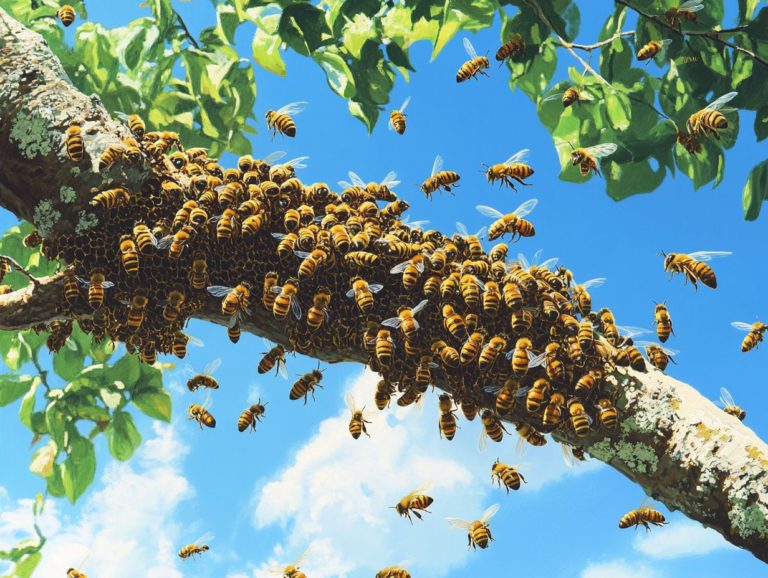The Importance of Bee Conservation Efforts
Bees, including the honeybee (Apis mellifera) and native bees like Perdita minima, play an important role in our ecosystem. They serve as vital pollinators for a diverse range of plants, including many fruits and vegetables you depend on for nourishment.
These extraordinary creatures are currently facing a multitude of threats that endanger their populations. This, in turn, jeopardizes our environment and economy, including environmental issues like habitat loss and the use of harmful pesticides.
This article delves into the fascinating world of bees. It highlights why their conservation is essential and how you can actively participate in efforts to protect these crucial pollinators. Understanding the impact of climate change on their habitats is critical.
From cultivating bee-friendly gardens to supporting local beekeepers, discover the meaningful actions you can take to help ensure a flourishing future for bees. Planting trees and native plants can provide essential habitats for them.
Contents
- Key Takeaways:
- What Are Bees and Why Are They Important?
- Why Is Bee Conservation Important?
- How Can We Help Conserve Bees?
- What Are the Benefits of Bee Conservation?
- What Are Some Successful Bee Conservation Efforts?
- How Can We Get Involved in Bee Conservation?
- Frequently Asked Questions
- Why is it important to conserve bee populations?
- How do bee conservation efforts benefit the environment?
- What are some of the biggest threats to bee populations?
- What can individuals do to help with bee conservation efforts?
- How do bee conservation efforts impact our food supply?
- Are there any economic benefits to bee conservation efforts?
Key Takeaways:
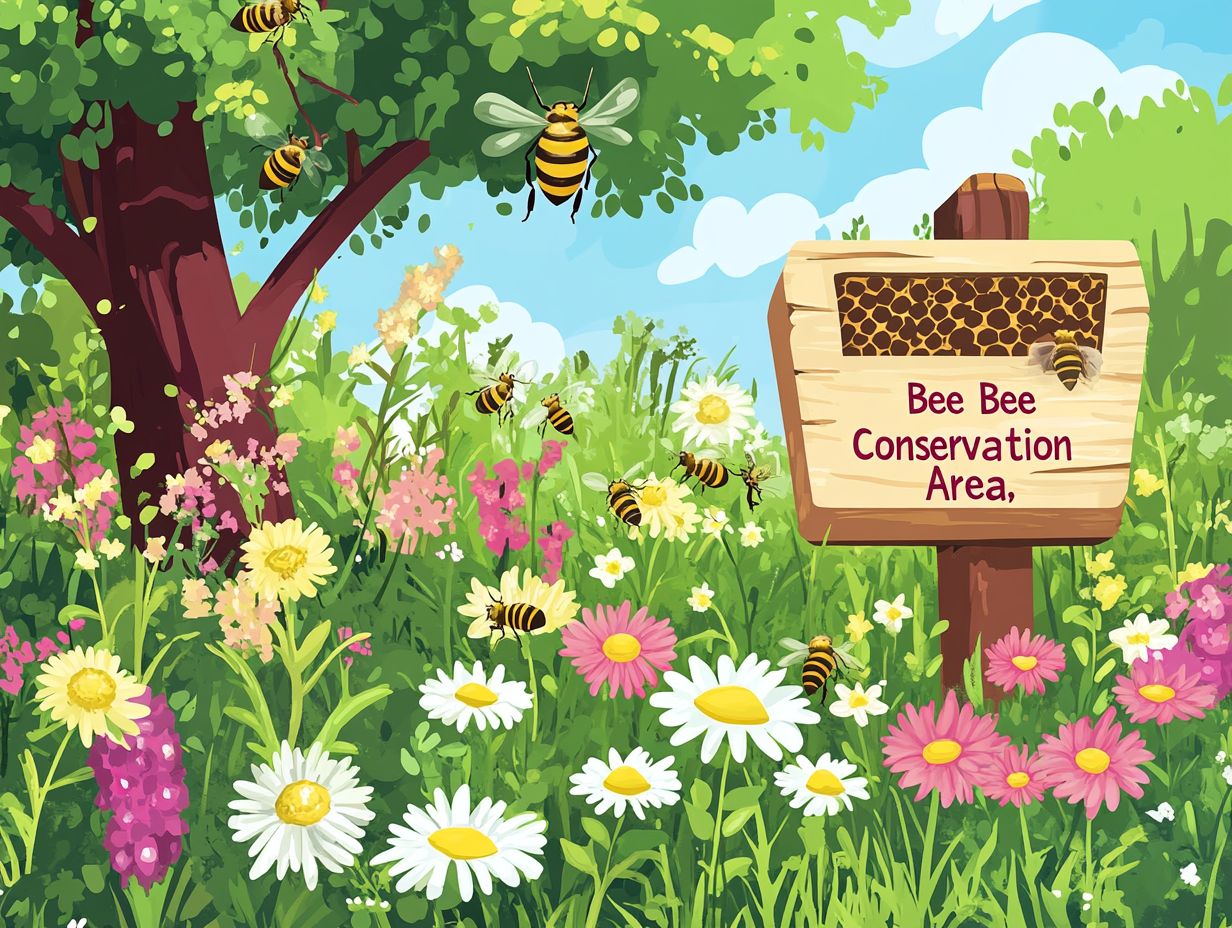
- Bee populations are crucial for pollination and ecosystem health, making bee conservation efforts essential for our well-being. Research shows that these efforts enhance species diversity and ecosystem services.
- Threats to bee populations include habitat loss, pesticides, and diseases, highlighting the importance of conservation efforts.
- Planting bee-friendly gardens, supporting local beekeepers, reducing pesticide use, and educating others are impactful ways to help conserve bees.
What Are Bees and Why Are They Important?
Bees, especially the honeybee (Apis mellifera) and various native bee species like the Gulf Coast solitary bee and the sunflower leafcutting bee, are critical as pollinators within our ecosystems. They play a significant role in maintaining the biodiversity that supports our food systems and natural habitats.
These diligent insects not only aid in fertilizing a diverse array of crops, such as almonds and lemons, but they also promote the growth of native plants. This bolsters the overall health of ecosystems an essential factor for both wildlife and human survival.
Their role in pollinating crops is intertwined with agricultural productivity. The decline of bee populations, driven by factors like pesticides, habitat loss, and climate change, presents serious concerns about food security and the stability of our environment. The phenomenon of colony collapse disorder exemplifies the impact of these threats.
Why Is Bee Conservation Important?
Bee conservation is of utmost importance, especially in light of the alarming decline in bee populations. These industrious pollinators play a pivotal role in supporting biodiversity and providing essential ecosystem services that benefit both agriculture and the environment.
The decline in bee numbers threatens our food supply and disrupts the balance of nature. This leads to the loss of native flora and fauna. Increasing public interest in conservation can lead to more robust protection initiatives.
By fostering public interest in bee conservation and engaging community scientists, you can catalyze effective actions, such as habitat restoration and sustainable practices. These efforts support local beekeepers and enhance overall environmental health. Organizations like Environment America and the U.S. Fish and Wildlife Service play a critical role in these efforts.
Join the movement to protect bees by planting a bee-friendly garden today!
Every action counts in the fight for bee conservation. Let s work together to protect these vital pollinators!
What Are the Threats to Bee Populations?
The threats to bee populations are complex and multifaceted, encompassing significant issues such as habitat loss from urbanization and agricultural expansion. The pervasive use of pesticides including harmful neonicotinoids (a class of pesticides harmful to bees) and the detrimental impacts of climate change lead to significant consequences for global biodiversity and agricultural productivity.
These threats compromise the health and stability of bee colonies, resulting in alarming phenomena like colony collapse disorder. To effectively tackle these challenges, urgent community action and policy changes are essential to safeguard both bees and the ecosystems they support. Advocacy for the Sustainable Development Goals can further these efforts.
Pesticides, for example, can severely disrupt the foraging behavior and reproductive capabilities of bees, leading to significant population declines over time. Climate change aggravates these challenges by altering flowering times and food availability, forcing bees to adapt at a pace that may not be sustainable. Conservation strategies must address these multifaceted threats to ensure species diversity.
Public lands are vital in conservation efforts, offering safe habitats where bees can flourish. Join the movement to help bees by:
- Act now by advocating for organic farming practices!
- Planting pollinator-friendly gardens
- Supporting local initiatives dedicated to preserving and restoring bee habitats
Through collective grassroots efforts, you can help instigate policy shifts that prioritize the well-being of these essential pollinators.
How Can We Help Conserve Bees?
You and your community can make a significant impact on bee conservation by incorporating practical measures into your daily lives. Consider planting bee-friendly gardens, supporting local beekeepers, and minimizing pesticide use in your surroundings. Engaging in educational activities can amplify your conservation efforts.
By creating habitats filled with native plants that offer nectar and pollen, you play a crucial role in sustaining bee populations. Moreover, educating others about the importance of bees can inspire a collective commitment to conservation. Participation in community science projects can further enhance these efforts.
Engaging in fundraising for bee protection initiatives and participating in community science efforts are further steps you can take to enable yourself and others in contributing to the well-being of bee populations and the ecosystems they inhabit. Your actions, no matter how small, can collectively foster a healthier environment for these essential pollinators. Promoting public interest can drive more effective conservation strategies.
1. Planting Bee-Friendly Gardens
Creating bee-friendly gardens stands out as one of the most impactful ways you can support local bee populations and enhance biodiversity. These gardens become vital habitats, brimming with diverse flowers and native plants that produce nectar and pollen. Incorporating water sources and trees can further enhance these habitats.
By incorporating a variety of flowering plants that bloom at different times throughout the growing season, you can establish a continuous food source for bees. This helps foster healthier pollinator populations and contributes to the overall health of the ecosystem.
Selecting native plants is crucial in this endeavor, as they are well-adapted to your local climate and soil, simplifying maintenance. These plants thrive without the need for chemical fertilizers and naturally attract local bee species.
When designing your garden layout, consider clustering similar plants together to effectively draw in bees. Allowing some areas to remain a bit wild or unkempt provides natural nesting sites for these crucial pollinators.
As you maintain your garden, focus on avoiding pesticides that can harm pollinators and consider adding water sources, such as shallow dishes filled with pebbles. By creating this safe haven, you can revel in the beauty of flourishing wildlife while playing a vital role in sustaining local ecosystems.
Every small action counts! Together, we can protect our bees and ensure a thriving ecosystem.
2. Supporting Local Beekeepers
Supporting local beekeepers is essential for preserving bee populations and ensuring the sustainability of honey production in your community. These dedicated individuals are at the forefront of pollinator health and conservation efforts. When you choose to purchase honey and other bee products locally, you not only contribute to the economic health of beekeeping but also champion sustainable practices that benefit both bees and the environment. Beekeepers’ efforts are vital to maintaining species diversity and ecosystem services.
Engaging with local beekeeping through workshops allows you to delve into the intricate relationships between bees and ecosystems. You’ll gain insights into hive management and the crucial role of pollination, which helps you appreciate more these vital insects. Support from public lands enhances conservation efforts.
By advocating for local initiatives such as community gardens or natural foraging spaces you can enhance habitats for bees and underscore the interconnectedness of local agriculture with broader conservation efforts.
Every action you take to support beekeepers leads to healthier bee populations, ensuring the continued production of honey and other hive-related products that enrich everyone s lives.
3. Reducing Pesticide Use
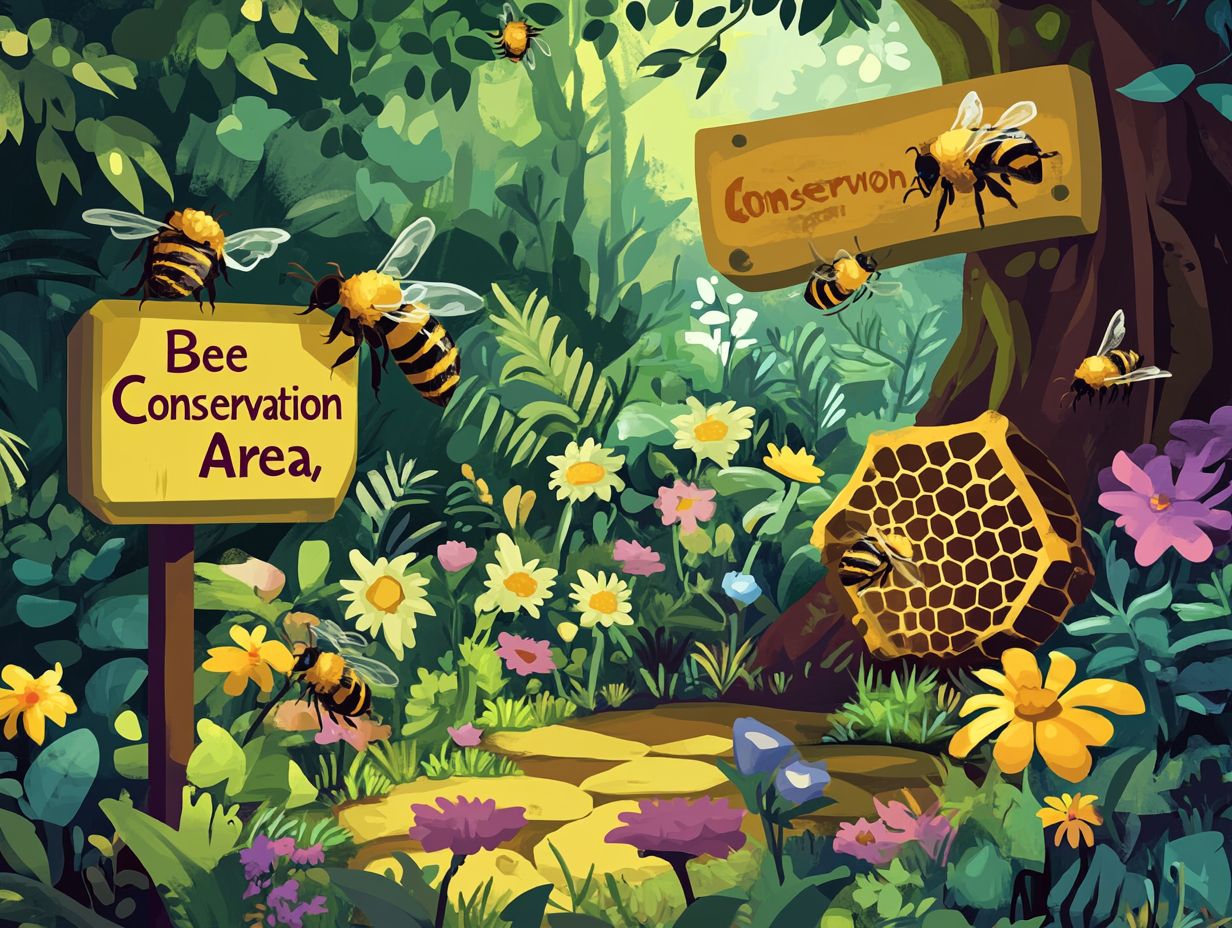
Reducing pesticide use, especially harmful substances like neonicotinoids, is crucial for safeguarding bee health and enhancing environmental well-being. These chemicals significantly contribute to the decline of bee populations and the degradation of their habitats. By embracing smart pest control methods that use natural solutions, you and your community can cultivate safer environments for bees and other beneficial insects, ultimately fostering biodiversity and supporting vital conservation efforts. Adopting organic farming practices can also play a significant role in these efforts.
Consider practices such as:
- crop rotation,
- encouraging natural predators, and
- using physical barriers to deter pests.
These action steps can significantly reduce the reliance on harmful chemicals. Make informed choices in your gardens and lawns by opting for organic solutions or companion planting. It s essential for community initiatives to unite in promoting these eco-friendly practices, as collective action amplifies impact and creates a ripple effect that benefits local ecosystems.
When everyone is informed and takes responsibility, the cumulative effect can lead to healthier environments, protecting not only pollinators but also the broader ecological system. Promoting education on sustainable practices is key to achieving these goals.
4. Educating Others About Bee Conservation
Educating others about bee conservation is vital! It raises awareness and inspires action. By sharing knowledge, you can spark greater community engagement and action. Consider organizing workshops, creating informative materials, and utilizing community projects that involve everyone to effectively disseminate information about the critical roles bees play in our ecosystems and the actions that can be taken to support their conservation. Introducing native plants and trees to create habitats for wildlife can also be part of these efforts.
Successful educational programs, like teaming up with schools and local beekeeping clubs, show amazing benefits, inspiring younger generations to appreciate and protect the environment. Community initiatives, such as pollinator gardens, not only provide vital habitats but also offer hands-on learning experiences. By championing these programs, you and your fellow community members can witness firsthand the positive impact of your involvement, deepening your connection to local biodiversity and ensuring species diversity.
As awareness increases, participation rates in conservation efforts also rise, cultivating a sense of stewardship among participants. This reinforces a collective responsibility to safeguard these essential pollinators, ensuring their vital contributions to our ecosystem endure for generations to come. Join us today in spreading the word and protecting our precious pollinators!
What Are the Benefits of Bee Conservation?
The benefits of bee conservation extend far beyond simply ensuring the survival of bee populations. Bees play a crucial role in agriculture, biodiversity, and the overall health of ecosystems. Bee conservation supports not only honeybees but also native bees like Perdita minima and Xylocopa virginica.
By committing to conserve bees, you significantly enhance the pollination of essential crops like fruits and vegetables. This boosts food production and promotes economic stability and food security.
A thriving bee population boosts biodiversity and leads to healthier ecosystems that can adapt to environmental changes and enhance overall resilience. Effective conservation strategies are crucial to counteract the negative impacts of climate change and habitat loss.
1. Pollination for Agriculture
Pollination is a vital benefit to the environment provided by bees. It enhances the yields of a wide array of crops, from almonds to vegetables, playing a key role in agricultural production and food security. The intricate relationship between bees and the crops they pollinate sustains livelihoods for farmers and supports larger economic systems, ensuring a consistent food supply for communities worldwide.
This relationship is critical for the growth of crops such as lemons and blueberries. Research indicates that bee pollination contributes an impressive estimated $15 billion annually to U.S. agriculture alone, underscoring its importance in boosting crop yields.
Take California’s almond industry as an example; nearly 80% of the nation s almonds depend on honeybee pollination, generating an economic impact that supports thousands of jobs and local businesses. Bee species such as Osmia lignaria and macropis cuckoo bee actively boost these economic benefits.
When bee populations decline, farmers grapple with reduced harvests. This can lead to increased food prices and jeopardize food security. We must understand the importance of these vital pollinators now to protect our future food supply!
Addressing pesticide use and promoting sustainable farming practices are essential action steps for mitigating bee decline. Let s tackle these issues together!
2. Biodiversity and Ecosystem Health
Engaging in bee conservation is essential, as it plays a crucial role in supporting biodiversity and maintaining the health of ecosystems. As a significant group of pollinators, bees contribute to the reproduction of many native plants that are vital for keeping ecosystems balanced, including plants that provide both food and nectar sources.
Healthy ecosystems do more than just support a variety of wildlife; they provide important services like soil health and water retention, critical for sustainable agriculture and environmental resilience. This highlights the vital role of species diversity in maintaining ecosystem health.
By taking steps to protect bee populations, you enhance the flourishing of native flora, including beloved species like clover, sunflowers, and blueberries, which depend heavily on these diligent pollinators. The presence of bees ensures that these plants can reproduce effectively, fostering richer undergrowth and providing more food sources for wildlife, including birds and small mammals.
This also supports the conservation of native bee species like the Gulf Coast solitary bee and the sunflower leafcutting bee. These plants play a role in stabilizing soil and sequestering carbon, helping to mitigate climate change.
As biodiversity thrives, it cultivates a more resilient environment capable of tackling ecological challenges, further emphasizing the interconnectedness of bees and the overall health of our ecosystems. Together, let’s make a difference for our bees!
3. Economic Benefits
The economic advantages of bee conservation are substantial, especially in agriculture, where bees play a vital role in pollinating a wide range of crops that boost both local and global economies. As a farmer, relying on bees for the successful production of fruits, vegetables, and nuts means that ensuring the health and survival of bee populations directly leads to improved yields and economic sustainability for your community. Supporting local beekeepers in maintaining healthy bee populations is vital for this success.
Recent studies estimate that bee pollination contributes over $15 billion to the U.S. agricultural economy alone, highlighting their critical role in crop production. By adopting sustainable farming practices that prioritize bee health like minimizing pesticide use and promoting biodiversity you can secure long-term economic viability for your operations. This aligns with the Sustainable Development Goals and emphasizes environmental responsibility.
Nurturing a healthier ecosystem with thriving bee populations ensures consistent crop yields, reduces reliance on expensive chemical inputs, and opens doors to premium markets that appreciate environmentally conscious practices.
Ultimately, supporting bee conservation transcends environmental responsibility; it is a savvy economic strategy for anyone in the agricultural sector.
What Are Some Successful Bee Conservation Efforts?
You will find that successful bee conservation efforts are blossoming around the world, highlighting the remarkable impact of community action, scientific research, and the dedication of local beekeepers in tackling the challenges faced by bee populations. Organizations like Environment America and the U.S. Fish and Wildlife Service also play crucial roles in these efforts.
These initiatives commonly encompass habitat restoration projects, educational programs designed to raise awareness, and funding opportunities that promote sustainable practices. This collaborative approach to conservation not only benefits the bees but also enhances the health of the larger ecosystem. In places like Sacramento, California, such efforts are already making a notable impact.
1. The Honeybee Health Improvement Project
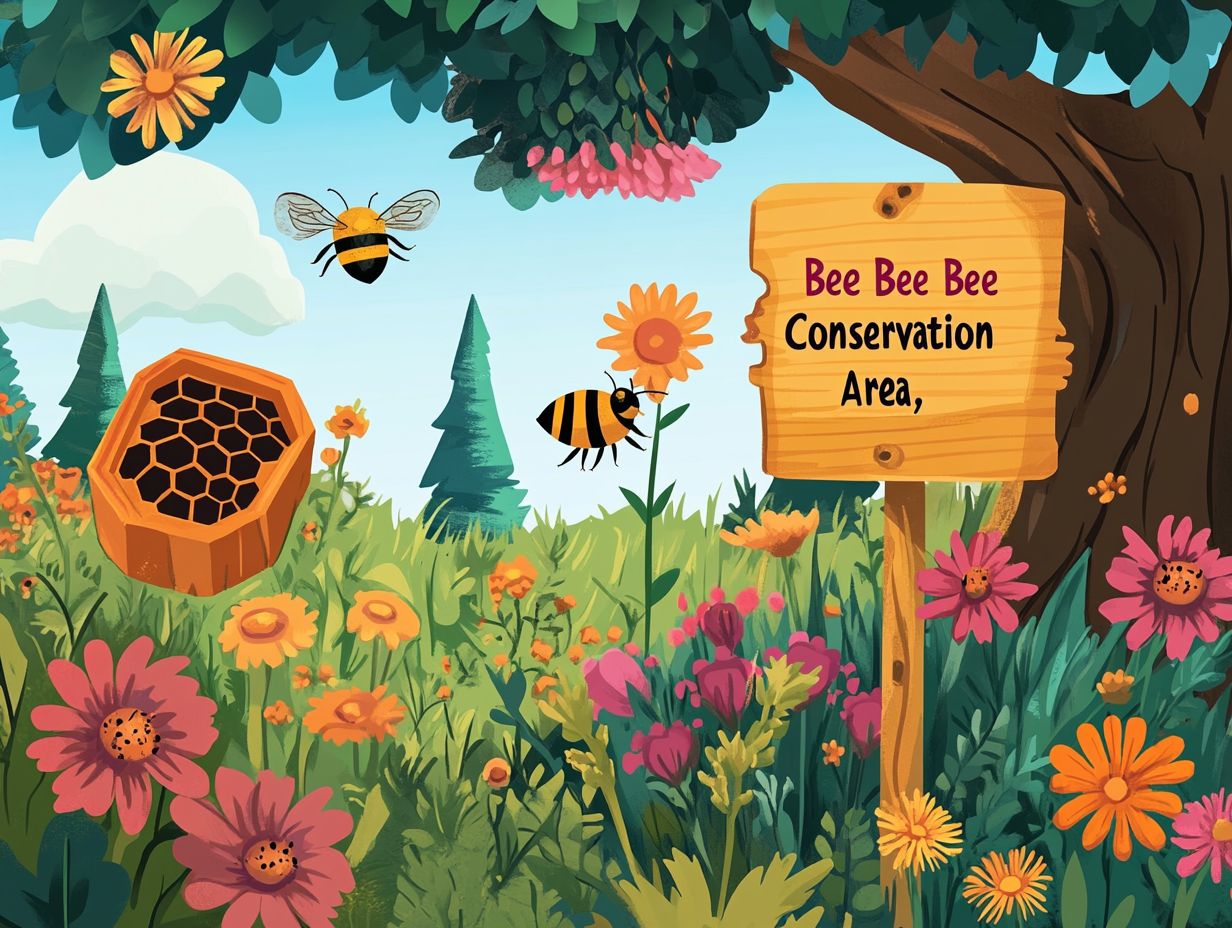
The Honeybee Health Improvement Project is your gateway to enhancing the health and sustainability of honeybee populations, all while engaging with your local beekeeping community. This initiative tackles critical issues like colony collapse disorder and conducts research into best practices, equipping you with the resources and knowledge needed to nurture healthier bee colonies. It also addresses the impacts of neonicotinoids and other harmful pesticides.
Through workshops, field demonstrations, and the sharing of research findings, this project enables you to implement effective management strategies that benefit both your hives and the ecosystems surrounding them. Recent research underscores the importance of adopting integrated pest management techniques and resilient breeding stock, both of which can significantly enhance colony health.
Success stories from fellow beekeepers illustrate the profound impact this project can have. Many have reported increased honey production and improved vitality in their colonies, while others have contributed valuable data that supports broader conservation efforts. By fostering a community of informed beekeepers, this initiative not only sustains local livelihoods but also plays a crucial role in global bee conservation efforts.
2. The Great Sunflower Project
The Great Sunflower Project is a remarkable community-based project that invites you to play a key role in monitoring bee populations while enhancing your understanding of pollinator conservation. By engaging in straightforward data collection methods, you contribute to valuable information that researchers use to track bee populations and their habitat use. This information ultimately helps shape effective conservation strategies and raises public awareness. The initiative helps protect species like Apis mellifera and other native bees.
By participating in this project, you can make a real difference for your community and the environment, all while deepening your grasp of how ecosystems work. Through hands-on experiences, you ll discover the vital role bees play in our ecosystem and the challenges they face from habitat loss and pollution. This highlights why planting pollinator-friendly flowers and maintaining gardens is crucial.
The project also encourages you to create pollinator-friendly habitats, fostering both awareness and proactive measures towards conservation. This collective effort culminates in a comprehensive database that scientists can use to monitor trends in bee populations, refining strategies aimed at safeguarding these essential insects for future generations.
3. The Bee-Friendly Farming Initiative
The Bee-Friendly Farming Initiative stands as a forward-thinking program that champions sustainable agricultural practices to enhance pollinator health and bolster bee populations through habitat restoration and conservation techniques. As you participate in this initiative, you will receive expert guidance on cultivating bee-friendly environments on your farm, benefiting both your agricultural productivity and environmental sustainability. This initiative also outlines action steps to mitigate the decline of bee populations.
By embracing practices such as planting a diverse array of flowering crops, minimizing pesticide use, and establishing buffer zones filled with native plants, you ll create sanctuaries for bees while boosting your yields. These sustainable techniques will enhance the resilience of local ecosystems, leading to improved soil health and better water retention.
The economic benefits are noteworthy; as pollinator populations flourish, you can expect higher crop yields, reduced reliance on chemical inputs, and increased profit margins. By adopting these practices, you contribute to a healthier environment, promote biodiversity, and ensure the long-term viability of both your farming endeavors and bee populations.
How Can We Get Involved in Bee Conservation?
Engaging in bee conservation offers a variety of rewarding avenues for you to explore. Whether you choose to join local beekeeping associations, participate in volunteer opportunities, or advocate for legislation that safeguards bee habitats, each step contributes to a larger movement dedicated to the survival of these vital pollinators.
By immersing yourself in these efforts, you not only play a crucial role in saving the bees but also cultivate a richer connection with your community and the environment. Act now to help save these vital pollinators!
1. Joining Local Beekeeping Associations
Joining local beekeeping associations offers you a distinct opportunity to connect with fellow enthusiasts, acquire invaluable knowledge, and directly support bee conservation efforts within your community. These associations typically provide educational resources, workshops, and networking events that enable you to deepen your involvement in beekeeping and conservation initiatives.
For instance, by participating in hands-on workshops led by experienced beekeepers, you can learn about hive maintenance and bee biology while building camaraderie with like-minded individuals. Many associations also engage in community outreach programs that highlight the importance of pollinators and create chances for you to assist local farmers in adopting sustainable practices.
Success stories abound, such as an urban beekeeping initiative in a bustling metropolitan area, where a local association has successfully established pollinator-friendly gardens that engage both schools and residents. This initiative cultivates a deeper appreciation for bees and underscores the vital role they play in our ecosystem, inviting you to be a part of something meaningful.
2. Volunteering with Bee Conservation Organizations
Volunteering with bee conservation organizations offers you a remarkable opportunity to engage in initiatives that genuinely protect and support pollinator populations, all while gaining valuable hands-on experience in conservation efforts. You might find yourself involved in habitat restoration projects, educational outreach programs, or community science initiatives that rally the public to monitor bee populations.
Take the Xerces Society, for example. They provide volunteer roles in habitat restoration, where you can help plant native flowers that serve as essential food sources for bees. Meanwhile, the Pollinator Partnership emphasizes community involvement, encouraging you to organize local awareness events that enlighten the public on the critical role pollinators play in our ecosystem.
On another front, the Bee Conservancy invites you to participate in citizen science projects, where you can gather data on bee sightings and contribute to important research.
By taking part in these collective efforts, you not only enhance the habitats where bees can thrive but also cultivate a deeper appreciation for these vital creatures, ultimately leading to more effective conservation outcomes.
3. Supporting Legislation for Bee Protection
Supporting legislation for bee protection offers you a powerful opportunity to advocate for policies that safeguard bee habitats and promote sustainable practices beneficial to pollinators. By engaging with local representatives and participating in community advocacy initiatives, you can help raise public interest in the critical role bees play and ensure their needs are prioritized in environmental legislation.
If you re eager to make a difference, start by educating yourself about existing laws and proposed bills related to bee conservation. This information is readily accessible through various online platforms dedicated to environmental advocacy. Local environmental organizations often provide invaluable resources and workshops that can guide you in effectively communicating with legislators and influencing public policy.
Success stories abound in this arena, with campaigns leading to the establishment of protected areas and improved pesticide regulations. These examples highlight the potential impact of collective action. By joining forces with local groups, you can actively contribute to ongoing efforts that not only protect bees but also foster a healthier ecosystem for everyone.
Frequently Asked Questions
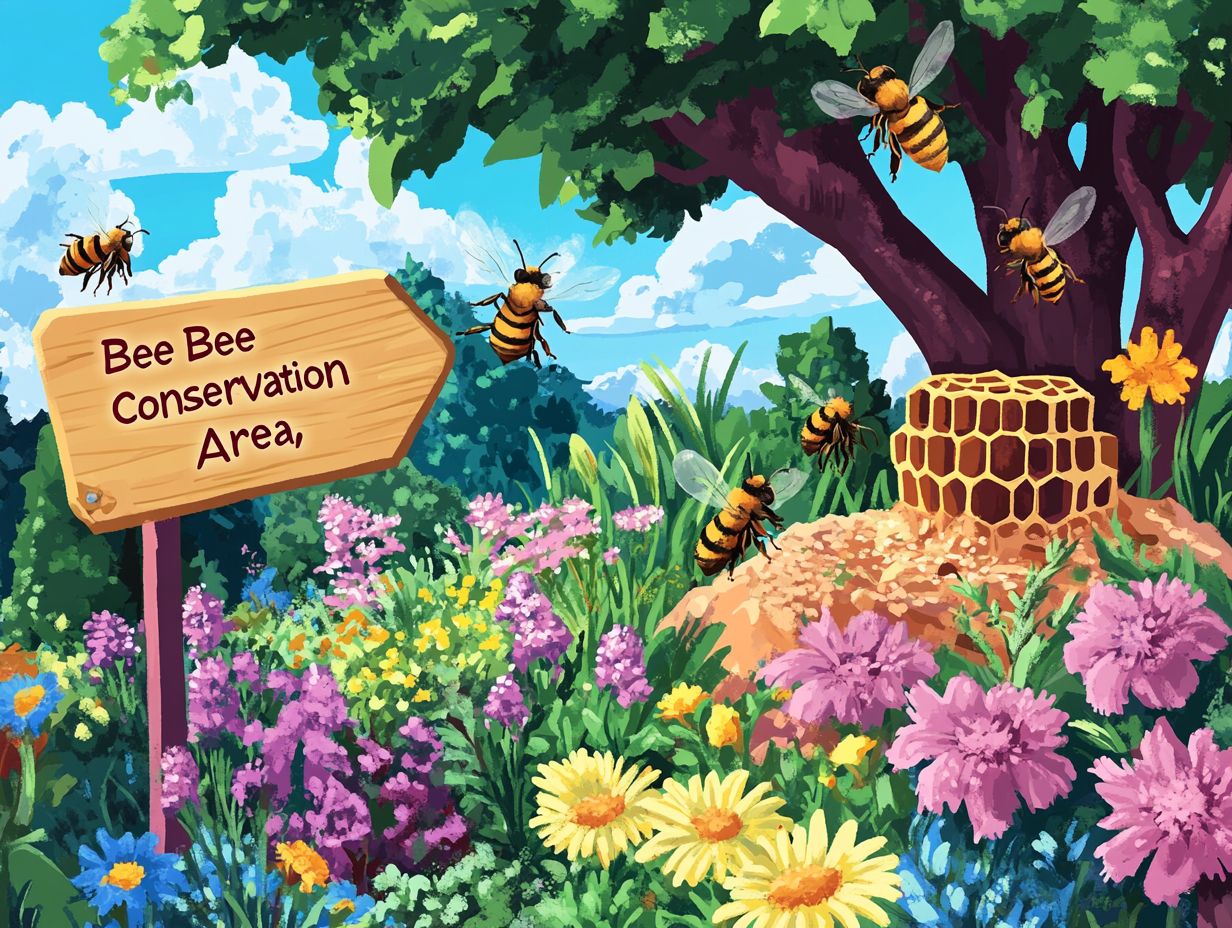
Why is it important to conserve bee populations?
Bee conservation efforts are crucial because bees play a vital role in pollination, which is necessary for the growth and reproduction of many plant species. Without bees, our ecosystem would suffer and the food supply for both humans and animals would be greatly impacted.
How do bee conservation efforts benefit the environment?
Bee conservation efforts help maintain a healthy and diverse ecosystem. Bees are important pollinators for plants, which contribute to the overall health and balance of the environment. By protecting bees, we also protect other plants and animals that depend on them.
What are some of the biggest threats to bee populations?
The biggest threats to bee populations include habitat loss, pesticide use, diseases and parasites, and climate change. These factors can greatly impact bee colonies and contribute to their decline.
What can individuals do to help with bee conservation efforts?
Individuals can help with bee conservation efforts by planting pollinator-friendly plants in their gardens, avoiding the use of pesticides and herbicides, supporting local beekeepers, and educating others about the importance of bees.
How do bee conservation efforts impact our food supply?
Bees are responsible for pollinating a large portion of the world’s food crops. Without bees, the production of fruits, vegetables, and nuts would significantly decrease, leading to food shortages and higher food prices.
Are there any economic benefits to bee conservation efforts?
Bee conservation efforts not only benefit the environment, but also have economic benefits. Bees contribute to the production of many crops, as well as honey and beeswax, which are valuable commodities. By protecting bees, we are also protecting these industries and the jobs that rely on them.

